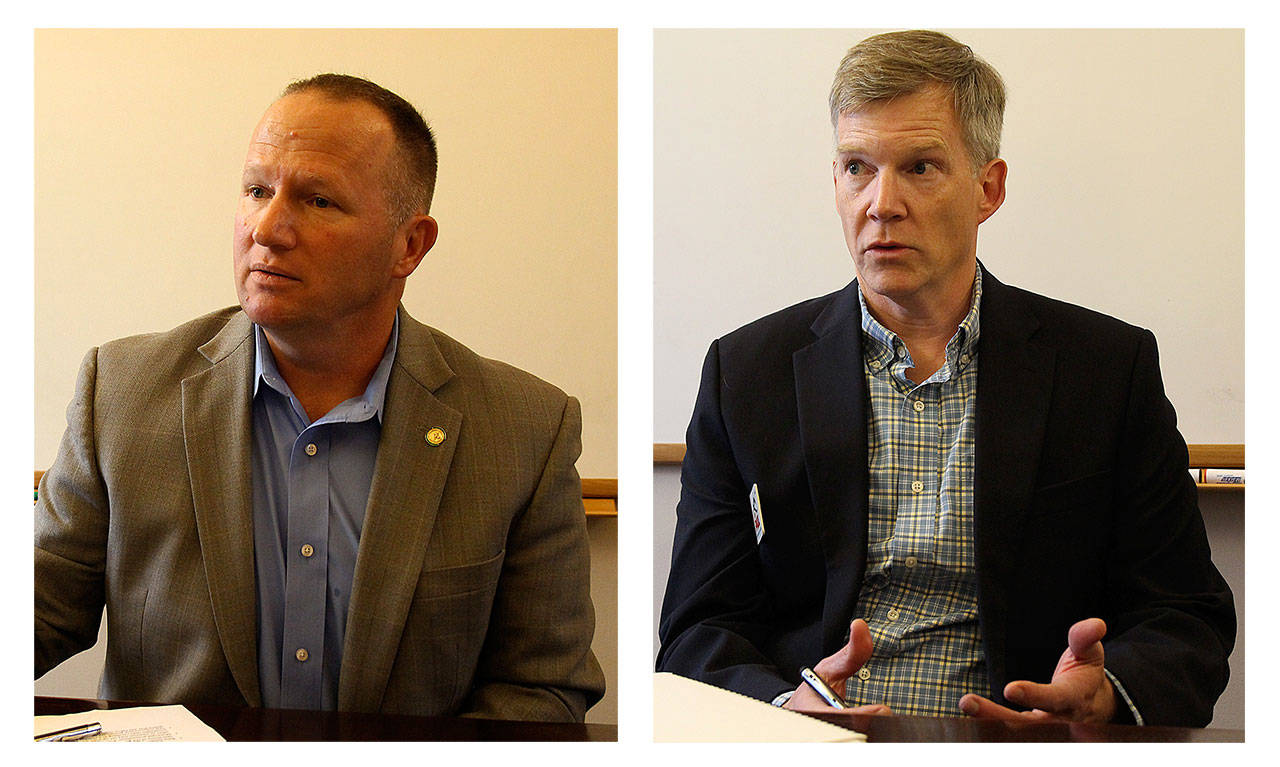District 10 state House candidate Dave Paul said he’s running because he believes his opponent, incumbent Dave Hayes, R-Camano Island, doesn’t adequately represent the area.
“He’s not as visible as he could be, not as responsive as he could be,” said Paul, who is running as a Democrat. “… I think I could do a better job.”
Hayes said he’s running for reelection because he still has “unfinished business” to work on. His priorities have been, and continue to be, public safety and transportation, he said.
“I’m uniquely situated and qualified to work on these issues with my perspective and resources that I have as a law enforcement officer,” said Hayes, who is a sergeant with the Snohomish County Sheriff’s Office.
Paul said Hayes’ voting record doesn’t align with the “purple” values of the district.
“My opponent does a good job looking moderate, and he’s a nice guy,” said Paul. “But when it comes to his votes, he takes a real extreme position.”
He pointed in particular to Hayes’ votes against bans on bump stocks and gay conversion therapy. Paul supports raising the minimum age to buy a military-style weapon to 21 and adding other measures to regulate the sale of guns.
He called Hayes’ vote on the gun accessory “indefensible.”
Hayes said he believed the bill did not “promote public safety,” and instead he advocates for legislation that strengthens the gun offender database.
On the gay conversion therapy bill passed last session, Hayes said the practice is “absolutely wrong,” but he voted against the ban because there were amendments that made it “too restrictive” on parents and therapists.
If elected, Paul said education would be one of his highest priorities.
Paul is a vice president at Skagit Valley College and current president of the Oak Harbor Education Foundation. He has also served on the Oak Harbor School District’s budget committee.
“I’ve seen how education transforms lives,” he said.
His emphasis would be on creating pathways to living wage jobs and making them “as short as possible with as little debt as possible.” He supports apprenticeship programs and introducing students in middle and high school to different trades and skills.
Hayes supported the recent increase in education funding by the state, he said. However, he thought there was not enough structure in how pay increases happened across the state and that it did not fix the equity issue the Legislature was trying to address.
“There’s still more work to do,” he said.
Hayes said as a result of his profession, mental health and substance abuse issues, particularly opioid addiction, are major focuses for him. He wants greater investment in partnerships between law enforcement and human services.
He helped secure funding for a diversion center in Everett that helps homeless individuals receive treatment for mental health and addiction issues and offers support in finding a job and housing.
Hayes said he hopes the data coming back from the program will drive future investments in other communities.
A report with information on the behavioral health services provided, how many clients secured stable housing and how many completed their detoxification or chemical dependency treatment program will be submitted to lawmakers Oct. 1, 2019.
“I believe it’s going to be a resounding success,” he said.
Paul also cited mental health and addiction as top priorities. He said an emphasis should be placed on providing adequate mental health care to K-12 students and special education.
Another issue is the Medicare reimbursement rate for mental health workers is not high enough in rural areas, he said. More support should be given for those who want to be mental health professionals, Paul said, whether in loan forgiveness or support in school for those getting required internship hours or raising salaries in the field.
“It’s an investment,” he said.
During his work at Skagit Valley College, he said he’s seen what early support can do for someone struggling with either substance abuse or mental health problems.
More recently, Hayes said he’s started to look into the issue of affordable housing throughout the district and state. He said there isn’t enough flexibility in the state’s Growth Management Act, and plans to bring forward a bill to allow military communities, such as Oak Harbor, to expand when spikes in population occur.
Paul said the danger of relaxing GMA regulations is that new developments that might go in won’t necessarily be more affordable. Incentives should be given for apartments, condominiums, “starter homes” and mid-range houses, he said.
Paul led Hayes in the August primary with over 52 percent of the vote. Hayes said he noticed similar results with Republican incumbents across Western Washington.
“There’s other issues going on that are beyond my control,” he said.
Paul also said the national political climate has impacted the election.
“Democrats are motivated,” he said.
The general election is Nov. 6.



